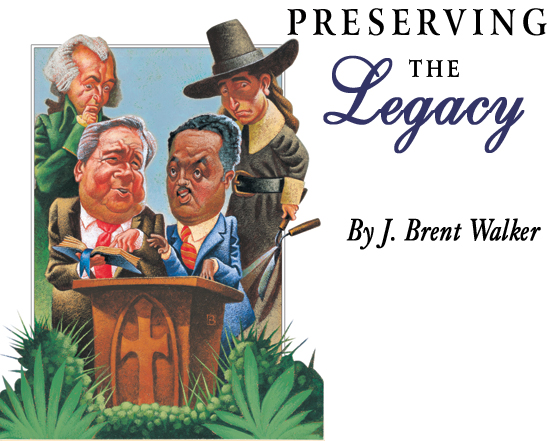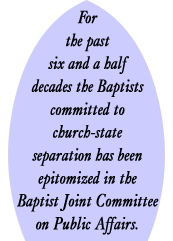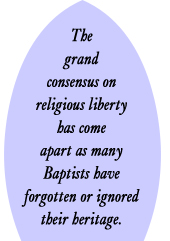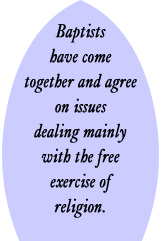Preserving the Legacy
J. Brent Walker May/June 2003
Getting your Trinity Audio player ready...


To paraphrase folk singer Pete Seeger, "Where have all the Baptists gone?"
That's a fair question for those watching today's battles over church-state separation, for those who might be surprised to find people identified as Baptist contending for government sponsorship and funding of religion.
After all, Baptists helped forge the American experiment in religious liberty that has shown the world the value of the separation of church and state. But today Baptist ranks are spotted with significant numbers who are convinced that their faith can be legitimately advanced with the help of government.
Buddy Shurden, in his landmark work a quarter century ago, Not a Silent People, talks about those "battling Baptists" and the controversies that shaped their heritage. The old saw is true: "Where you get two or three Baptists together, there you will have four or five opinions."
Bill Moyers, in his own inimitable way, paints a portrait of Baptists in history and contemporary culture: "Baptists have been to the left of the American establishment—and to the right. Jesse Jackson is a Baptist; so is Jesse Helms. Baptists defended slavery, and Baptists agitated to end it. Some black Baptist churches are precincts of the Democratic Party, while in some white churches GOP stands for God's Own Preserve. Some Baptists read the Bible as if it were a AAA road map to Armageddon; others find it a spiritual codebook to the mysteries and miracles of the kingdom within. Millions of Baptists see American culture as the enemy. Millions of others proclaim that we are part of the show. Onlookers shake their heads at how people so disputatious could be defined by a common name; those of us who wear it shrug our shoulders at the anomalies and schisms and go on punching (usually each other)."
Despite this heritage of fightin', feudin', and just foolin' around, Baptists historically have been unified in their pursuit of religious liberty and defense of the separation of church and state. In fact, E. Y. Mullins calls church-state separation an "axiom" of Baptists in his landmark work on the group's distinctives. Religious freedom and church-state separation have always been at the very core of what it means to be a Baptist.
For Baptists liberty is grounded in Scripture. Its taproot runs deep into the creation accounts in Genesis. God's decision to make human beings in His image necessarily implies a freedom on our part to say yes or no—to choose for or against a relationship with God, freely and voluntarily. Jesus also foreshadowed the modern doctrine of the separation of church and state when He said, "Render therefor, unto Caesar the things which are Caesar's; and unto God the things that are God's" (Matthew 22:21).*
Baptists fight for religious freedom because they suffered the hard lessons of history. We quickly learned that when religious zeal combines with the coercive power of the state, persecution often results and, at a minimum, consciences are ravaged. Simply stated, compelled conscience is an oxymoron.
From jail cells in England, to stockades in Massachusetts Bay, to whipping posts in Virginia, the names and words ring out over the centuries!
Thomas Helwys. After establishing the first Baptist congregation on English soil, Helwys offered a seminal treatise on religious liberty, A Short Declaration of the Mystery of Iniquity (1612), and sent a copy to King James I. In his inscription he wrote that the king was a mortal man, not God, and had no power over the souls of his subjects. For his trouble Helwys and his wife, Joan, were severely persecuted. He later died in Newgate Prison.
Roger Williams. Williams came from England to Massachusetts Bay in 1631, preaching and teaching "soul freedom"—a God-infused liberty of conscience. Believing that faith could not be dictated by any government authority, but must be nurtured freely and expressed directly to God, Williams advocated a "hedge or wall of separation between the garden of the church and the wilderness of the world." The theocrats in Massachusetts were so offended that they kicked Williams out of the colony. He trekked to what would become Rhode Island and began that "livlie experiment" in religious liberty and founded the first Baptist church on North American soil.
John Leland. An evangelist preaching in Virginia during the heady 1780s, Leland boldly advocated religious liberty and the separation of church and state—as other Baptists were being jailed for preaching without a license from the state. He played a pivotal role in convincing our nation's Founders of the need for specific guarantees protecting religious freedom in the Bill of Rights. He stood toe-to-toe with the likes of Madison, Jefferson, and Mason, and never backed down on the way to the Bill of Rights, including the first 16 words: "Congress shall make no law respecting an establishment of religion, or prohibiting the free exercise thereof."
George W. Truett, standing in the tradition of Helwys, Williams, and Leland, spoke these words in a sermon preached on the east steps of the U.S. Capitol: "Baptists have one consistent record concerning liberty throughout their long and eventful history. They have never been a party to oppression of conscience. They have forever been the unwavering champions of liberty, both religious and civil. It is the natural and fundamental right of every human being to worship God or not, according to the dictates of conscience, and, as long as this does not infringe upon the rights of others, they are to be held accountable alone to God for all religious beliefs and practices. That utterance of Jesus, "render unto Caesar the things that are Caesar's, and unto God the things that are God's," is one of the most revolutionary utterances that ever fell from those lips. That utterance, once and for all, marked the divorcement of church and state. It marked a new area for creeds and deeds. It was the sunrise gun of the new day, the echoes of which are to go on and on until in every land, whether great or small, the doctrine shall have absolute supremacy everywhere of a free church in a free state."

For the past six and a half decades the Baptist commitment to church-state separation has been epitomized in the Baptist Joint Committee on Public Affairs, which provides a united Baptist voice for religious liberty in the nation's capital. The Baptist heritage of standing firm together for religious liberty and the separation of church and state in the context of theological and social diversity can hardly be denied.
But how is this Baptist heritage reflected in those who wear that label today? The Baptist Joint Committee (BJC) continues to hoist the banner of religious liberty, bringing together 14 different Baptist groups, hundreds of Baptist churches and thousands of individual Baptists—all cooperating in this common enterprise of defending and extending religious liberty for all. It focuses only on religious liberty and church-state separation. And as some Baptist individuals and bodies began to abandon church-state separation as a core concern during the latter part of the twentieth century, the BJC stood its ground, even as some wavering Baptists pulled their support.
The BJC understands that religious liberty is a gift from God; it does not result from any "toleration" on the part of the state. The architects of the nation fashioned political institutions to help protect that God-given religious freedom. The theological principle of soul freedom and its ethical expression in society—religious liberty for all—are protected by the constitutional constructs of no establishment and free exercise. Indeed, they form the twin pillars of our constitutional architecture.
The agency contends that government must not be allowed to either advance or inhibit religion, but be neutral toward religion, turning it loose to flourish or flounder on its own. Government must accommodate religion without advancing it, protect religion without promoting it, lift burdens on religion without extending religion or benefit. If government tries to either help or hurt any one religion, or even religion in general, everyone's religious freedom is threatened. For nearly seven decades the BJC has voiced a tripartite theme: Soul freedom is universal; religious liberty is nonnegotiable; church-state separation is indispensable.
Today, however, not all Baptists share this commitment to church-state separation. The grand consensus on religious liberty has come apart as many Baptists have forgotten or ignored their heritage. The persecuted minority now flexes the muscles of its newfound majority status. The ability to control the reins of government power leads many Baptists to want to use government to help promote their mission and message.

Fisher Humphreys, in his 1994 book, The Way We Were, declares that the "loss of the principle of the separation of church and state is the greatest tragedy in the history of the Southern Baptist Convention." With one of the leaders of the Southern Baptist Convention's (SBC) new regime proclaiming that the separation of church and state is the figment of the imagination of some infidel, who can blame Humphreys for his assessment?
Many claim that the United States is a "Christian nation," in which Christianity (their narrow version of it) is given a leg up, while others are, at best, tolerated in our increasingly pluralistic society. Yes, biblical values informed the development of American culture, and yes, Americans are a very religious people, but this country is nothing approaching a theocracy. We have a constitutional democracy in which all religions are welcomed and afforded real religious liberty.
Others argue that it is all right for government to promote religion as long as it does not prefer one tradition or religion over another. This is not what our framers intended. They considered four different amendments that would have made this idea of nonpreferential support for religion a part of the Bill of Rights, but they rejected it time after time after time after time. They settled on the language we now have of preventing laws even "respecting an establishment of religion, or prohibiting the free exercise thereof." And when government becomes involved in matters of religion, it never does it evenhandedly; it always prefers one over another, usually the majority. It is not only wrong, but as a practical matter it cannot be done.
Some say we have freedom of religion, not freedom from religion. This sounds nice, but it is not true. Without freedom from religion—that is, freedom from state-sponsored religion—we can never have freedom of religion in the full sense of the word.
In light of these philosophical disagreements, it should not surprise us that Baptists are on both sides of many of our contemporary church-state issues. For example, although the SBC, to its credit, declined to amend the article on religious liberty in the Baptist Faith and Message (a confession of faith adopted by the SBC in 1925 and revised in 1963 and 2000), many Southern Baptists take positions contrary to it.
Article XVII says: "Church and state should be separate. The church should not resort to civil power to carry on its work." But in 1998 some Southern Baptists—including the SBC's Ethics and Religious Liberty Commission (ERLC)—supported a proposed constitutional amendment providing for some form of state-sanctioned school prayer. The BJC opposed that amendment. Many Baptists support prayer at football games as long as every religion gets an opportunity to pray. How exactly do public schools achieve that when in most areas of our country they reflect an astonishing religious pluralism? How can they ever be evenhanded? In Birmingham, Alabama, who do you think is going to get to pray at the homecoming football game, the Baptist or the Buddhist? Who will be relegated to praying over the junior varsity baseball game in the spring?
The Baptist Faith and Message goes on to say: "The state has no right to impose taxes for the support of any form of religion." But many Southern Baptists support school vouchers and charitable-choice money to finance their social service ministries. However, for the government to take my tax money to pay for your religion or to take yours to pay for mine is, in Thomas Jefferson's words, "sinful and tyrannical." It was 200 years ago, and it still is today.
Article XVII also provides: "The gospel of Christ contemplates spiritual means for the pursuit of its ends." But many Southern Baptists approve of efforts to legislate the posting of the Ten Commandments, as if God needs or wants the help of civil government to defend the Decalogue. I can think of nothing better than for everyone to read and obey the Ten Commandments, but I can think of little worse than for government to tell them to do it. Do we really want government promoting and endorsing the message "I am the Lord your God, who brought you out of the land of Egypt, out of the house of bondage. You shall have no other gods before me" (Exodus 20:2, 3)? I think not.
In the interest of fairness and full disclosure, Baptists have come together and agree on issues dealing mainly with the free exercise of religion. For example, the BJC helped lead the broad coalition that worked for passage of the Religious Land Use and Institutionalized Persons Act (2000). This much-needed legislation gives churches increased protection against the heavy hand of zoning officials and other land-use regulators when they impede the church's ability to worship, proclaim the gospel, and minister in our increasingly crowded and urbanized country. Baptists across our land, including the ERLC, rallied behind this legislation.
So, what is our destiny? What will Baptists do and say with regard to religious liberty and the separation of church and state in the next decade, the next century? The answers depend on how diligent and dedicated those committed Baptist principles are in the marketplace of ideas. Our challenge is doubled by the recognition that it is not just some Baptists who disagree with our heritage, but other persons of faith as well.
Several things can be done to ensure that the traditional Baptist heritage turns into a lasting legacy.
First, reread the words of Scripture, and heed the witness of Jesus. Jesus never took a solitary shekel from Caesar or accepted help from Herod in proclaiming the gospel and advancing His mission. The words "Every one who calls upon the name of the Lord will be saved" (Romans 10:13)—the witness of a loving, evangelistic church. This is something that no government can compel.
Second, recover our heritage—recall the names of the heroes of our faith and their stories. The prophet Isaiah urges us to "look to the rock from which you were hewn, and to the quarry from which you were digged" (51:1). The writer of Hebrews calls them a "cloud of witnesses" (12:1). Carlyle Marney spoke of these "balcony people"—exemplars, role models, heroes—who, from their lofty perch on the balcony of our lives, continue to encourage and inspire and lift us up to greater heights.
Third, remember what it's like to be in the minority. Retelling the stories from the past will help. But we do not have to look to the past to learn a lesson here. My friends in Russia tell about the heavy hand of the Russian Orthodox Church, which frightens them as much as the religion-hostile government of the old Soviet Union. Yes, we need to remember and know what it is like to be a put-upon minority.

Fourth, resist triumphalism. This brash attitude often seen behind an in-your-face evangelism and the use of secular political power to advance the spiritual gospel needs to be held in check. This "soul freedom for me but not for thee" is not only wrong but also counterproductive. We need a spirit of humility and servanthood as we minister to the world and consider alliances with government.
And finally, redouble efforts to educate Baptists and all other Americans. As I travel around the country speaking and listening to people, I find most of them want to learn more about church-state issues. Yes, many ideologues have already made up their minds. But a large number of Baptists and other Americans—when they get past the bumper stickers and sound bites—are open to reasonable explanations.
So our destiny as freedom-loving Baptists and Americans depends on all of us coming together, working together, to reread Scripture, to recover our heritage, to remember what it was like to be a minority, to resist a spirit of triumphalism, and to redouble our efforts to educate an unbelieving and skeptical world.
Where have all the Baptists gone? They are right where they have always been. They can still be found in significant numbers working at the intersection of church and state to preserve the legacy of Helwys, Williams, Leland, and Truett. The major difference is that these days some of those they are battling at that intersection also wear the Baptist label.

________
J. Brent Walker is executive director of the Baptist Joint Committee in Washington, D.C.
________
* All Bible texts in this article are from the Revised Standard Version of the Bible, copyright